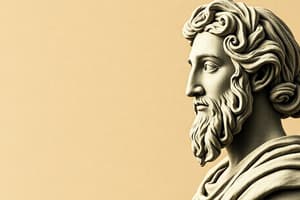Podcast
Questions and Answers
Which philosopher proposed the idea of dualism, asserting that the mind and body are distinct?
Which philosopher proposed the idea of dualism, asserting that the mind and body are distinct?
- Descartes (correct)
- Aristotle
- Hume
- Kant
What did Hume's Bundle Theory suggest about the self?
What did Hume's Bundle Theory suggest about the self?
- It is an illusion made up of perceptions. (correct)
- It is a unified entity distinct from the body.
- It exists independently of experience.
- It is immortal and eternal.
Which philosopher believed that the self is shaped by memories and experiences?
Which philosopher believed that the self is shaped by memories and experiences?
- Merleau-Ponty
- Locke (correct)
- Freud
- Ryle
What is the main assertion of Merleau-Ponty regarding the self?
What is the main assertion of Merleau-Ponty regarding the self?
What aspect of the self did Freud focus on in his psychological theory?
What aspect of the self did Freud focus on in his psychological theory?
Socrates is best known for emphasizing the importance of what in understanding the self?
Socrates is best known for emphasizing the importance of what in understanding the self?
Which philosopher introduced the idea that the self is demonstrated through behaviors and actions?
Which philosopher introduced the idea that the self is demonstrated through behaviors and actions?
In Descartes' view, what constitutes the foundation of existence?
In Descartes' view, what constitutes the foundation of existence?
Flashcards are hidden until you start studying
Study Notes
Socrates
- An influential Ancient Greek philosopher known for his teachings on self-awareness.
- Advocated for the principle of "Know thyself," emphasizing introspection as the path to wisdom.
Augustine
- A prominent theologian and philosopher whose ideas link the self closely with the divine.
- Believed that self-fulfillment is attainable through God’s grace.
Hume
- Scottish philosopher who argued that the self is an illusion.
- Introduced the Bundle Theory, suggesting that the self consists of a collection of perceptions, thoughts, and sensations rather than a singular entity.
Ryle
- British philosopher noted for his behaviorist approach to understanding the self.
- Coined the phrase "ghost in the machine," criticizing the dualistic separation of mind and body.
Plato
- Ancient philosopher who proposed that the self is immortal and exists independently of the physical body.
- Developed the Tripartite Theory of the Soul, dividing it into rational, spirited, and appetitive parts.
Descartes
- Renowned French philosopher, scientist, and mathematician famous for the quote "I think, therefore I am."
- Advocated for dualism, positing that mind and body are distinct entities.
Kant
- German philosopher who differentiated between the Inner Self, comprising emotions and rationality, and the Outer Self, related to physical senses and experiences.
Churchland
- Canadian philosopher focused on neurophilosophy, examining the relationship between neuroscience and philosophical understandings of self.
- Argued that the self is a product of brain activity and cognitive processes.
Aristotle
- Ancient Greek philosopher and polymath who viewed the body and soul as inseparable.
- Conceptualized the self as a unified being, integrating physical and metaphysical elements.
Locke
- English philosopher known for the theory of "tabula rasa," suggesting that individuals are born as blank slates.
- Posited that the self is shaped by memories and personal experiences over time.
Freud
- Austrian neurologist known for his psychoanalytic theory focused on the concept of the ego.
- Described the ego as a mediator balancing the demands of the superego and id.
Merleau-Ponty
- French philosopher who emphasized the importance of the physical body and sensory experiences in shaping the self.
- Rejected traditional dualism, asserting that selfhood is grounded in embodied experience.
Studying That Suits You
Use AI to generate personalized quizzes and flashcards to suit your learning preferences.




